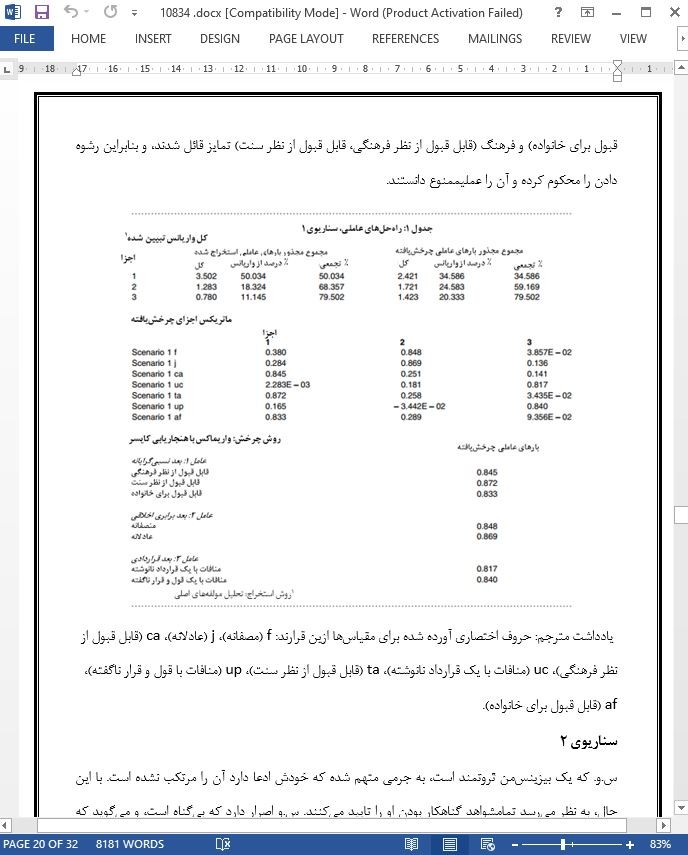
بررسی رشوه خواری از نظر فرهنگی در موریس
مقدمه
همچون دیگر بخشهای در حال توسعه جهان، در موریس نیز رشوهخواری، در کسب و کارها رایج است. برای برخی افراد، رشوهخواری راه سادهایست برای بیرون آمدن از یک موقعیت دشوار، و عملی قابل قبول به شمار میرود (گزارش کمیته منتخب در باب تقلب و فساد ، ۲۰۰۱). قابل قبول بودن این عمل به این شکل نیست که فرد آن را به عنوان عملی اجتنابناپذیر ببیند و یا از روی تسلیم آن را انجام دهد. مبنای این مقاله، نتایج همهپرسیای است که در کشور موریس برگزار شد و هدف آن مشخص کردن این مسئله بود که در یک کشور در حال توسعه، ابعاد مختلف اخلاق ، فرهنگ ، و وظیفه ، چه تاثیری بر ادراک اخلاقی افراد دارند.
نتیجهگیری
این نتایج گواه این هستند که یک عامل قدرتمند فرهنگی، پاسخهای افراد به سناریوها را تبیین میکند. دادههای مطالعات قبلی همگی از کشورهای غربی و به طور خاص از آمریکا بودند. با توجه به اینکه تا کنون از مقیاس ر.ر. فقط برای اخلاق بازاریابی در کشورهای توسعهیافته استفاده شده بود، استفاده از این مقیاس در موریس، فرصت جدیدی را ارائه میکرد؛ زیرا میشد مقیاس را در بررسی کلیتری از دنیای کسب و کار در یک کشور در حال توسعه به کار گرفت. شرکتکنندگان با سه سناریو مواجه شدند و بسته به میزان بزرگ بودن هر مشکل اخلاقی، هرکدام را به شکل متفاوتی ارزیابی کردند. اما به طور کلی، شواهدی که این نتایج ارائه میکنند مبنی بر این است که به عاملهای فرهنگی به شدت اتکا میشود. همچنین این نتایج تایید میکنند که ارزیابی اخلاقی هر موقعیت، مختص آن موقعیت است. مطالعات قبلی تاکید داشتند که مفهوم قرارداد و قول و قرار ضمنی ، در ارزیابی یک مسئله اخلاقی نقش اصلی را دارد؛ اما این نظریه در مورد موریس درست نیست. در هرکدام از سناریوهای این همهپرسی، یک بعد قراردادی/وظیفه وجود دارد که تکمیلکننده بعد اخلاقی است.
Introduction
In Mauritius, as in the rest of the developing world, bribery is a common characteristic of business. To some people, the practice of bribery provides an easy way out and is viewed as acceptable (Select Committee Report on Fraud and Corruption, 2001), as distinct from being accepted as an inevitable practice, with a feeling of resignation. This paper is based on the results of a survey conducted in Mauritius, the objective of which was to determine how different dimensions – moral, cultural and duty – impact on ethical perceptions in a developing nation.
Conclusion
The results give evidence of a strong cultural factor that explained the responses to the scenarios. The data pertaining to previous studies were all from the Western world, more specifically, the United States. The application of the R&R scale in Mauritius presented a new opportunity, considering that the scale, so far applied to marketing ethics in the developed world, was being used in a developing economy in the context of business more generally. Respondents were exposed to three scenarios and they evaluated each case somewhat differently, depending upon the seriousness of the ethical problem. Generally speaking, however, the results give evidence of the strong reliance on cultural factors and confirm that moral evaluations are specific to situations. While earlier studies emphasised the idea of implicit contract and promise as being inherent in the evaluation of an ethical problem, this theory does not hold in the case of Mauritius. In each of the scenarios that composed the survey, there is a contractual/duty dimension which is complementary to the moral dimension.

مقدمه
محیط پژوهش
فساد در کسب و کار
ادبیات تحقیق
رشوهخواری
روش
اطلاعات زمینهای
پرسشنامه
نمونه
ویژگیهای منحصر به فرد مطالعه موریس – استفاده از مقیاسهای هفتگانه
نتایج و بحث و بررسی
سناریوی ۱
سناریوی ۲
سناریوی ۳
آزمون پایایی
محدودیتهای این مطالعه
Introduction
Research setting
Literature
Bribery
Methodology Background
Questionnaire
Sample
Particularity of the Mauritian study – use of seven scales
Results and discussion
Scenario 1
Scenario 2
Scenario 3
Reliability testing
Limitations of the study
Conclusion
- اصل مقاله انگلیسی با فرمت ورد (word) با قابلیت ویرایش
- ترجمه فارسی مقاله با فرمت ورد (word) با قابلیت ویرایش، بدون آرم سایت ای ترجمه
- ترجمه فارسی مقاله با فرمت pdf، بدون آرم سایت ای ترجمه
